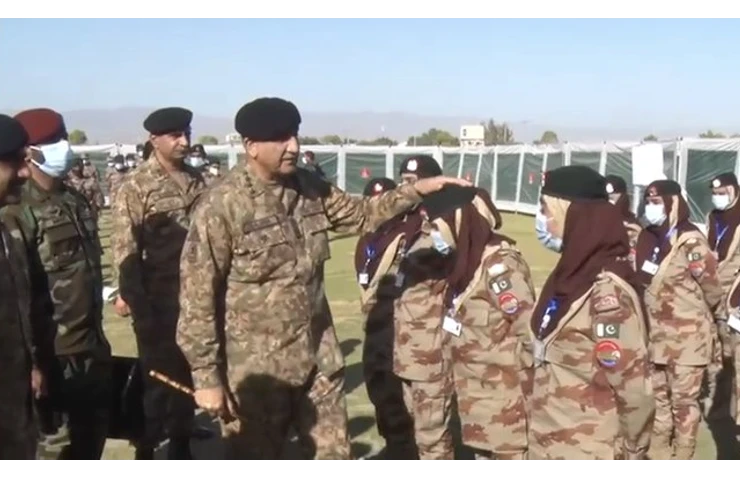In an audacious attack on Pakistani security forces on Wednesday night, Baloch fighters attacked two camps in Panjgur and Naushki, both in Balochistan.
These attacks that have caused significant casualties follow a recent strike on a Pakistani check point in which 10 soldiers were killed. Analysts say that the recent spate of attacks could mean that the Baloch nationalist movement has entered an unprecedented new phase.
Giving a statement on Thursday afternoon, Pakistan Interior Minister Sheikh Rashid Ahmed said that nine of the attackers have been killed while four Pakistani army soldiers also laid down their lives. He lauded the role of the Pakistani armed forces.
3 جنوری2022
پنجگوراورنوشکی میں سکیورٹی فورسزکے کیمپوں پردہشت گردحملوں
پر اہم پیغام جاری.@OfficialDGISPR @GovtofPakistan @PTVNewsOfficial pic.twitter.com/q4wcxuw6XT— Sheikh Rashid Ahmed (@ShkhRasheed) February 3, 2022
Earlier, the Pakistani military's media wing—Inter-Services Public Relations (ISPR) said that "both attacks have been successfully repulsed while inflicting heavy casualties to terrorists". ISPR had said that one soldier and four attackers were killed in the exchange of fire.
Prime Minister Imran Khan also tweeted: "We salute our brave security forces who repulsed terrorist attacks against security forces' camps in Panjgur & Naushki, Balochistan. The nation stands united behind our security forces who continue to give great sacrifices to protect us".
This was the second time in less than a week that the prime minister had to issue a statement over attacks on security forces.
We salute our brave security forces who repulsed terrorist attacks against security forces' camps in Panjgur & Naushki, Balochistan. The nation stands united behind our security forces who continue to give great sacrifices to protect us.
— Imran Khan (@ImranKhanPTI) February 3, 2022
With fighting going on in the two areas, curfew has been imposed in both Panjgur and Noshki.
Geopolitical analyst and Pakistan watcher Mark Kinra told India Narrative: “Today's attack is significant because Frontier Corps (FC) is Pakistan’s paramilitary force which was formed to maintain law and order situation in Balochistan and Khyber Pakhtunkhwa by the British. Pakistan has used FC against Baloch nationalists for a long time to crush the national sentiment but has been unsuccessful, therefore, this attack on the FC is pay back”.
Dawn newspaper said that in Panjgur, the Baloch fighters tried to enter the Frontier Corps army camp from two locations. In Noshki also the Baloch attempted to enter a Frontier Corps headquarters. The attacks were preceded by two blasts near the camps at Panjgur and Noshki.
The Baloch Liberation Army (BLA) claimed responsibility for the attacks. Kinra says that this seems to be one of the biggest attacks by Baloch groups against Pakistan. “The BLA claims to have killed 100 soldiers and even claims to have occupied FC camps, which has been refuted by ISPR, which also said that the situation is under control. However, ISPR claims seem to be untrue as Interior Minister Sheikh Rashid has claimed that four soldiers have died and the Pakistan Army is trying to control the situation as Baloch Nationalists are still fighting”.
Kinra adds that the BLA group headed by Bashir Zeb conducted these fidayeen attacks on the FC camps. “Attack was orchestrated by BLA Majeed Brigade (Suicide Squad). The Majeed Brigade has also carried out Pakistan Stock Exchange attack in Karachi in June 2020”, adds Kinra.
Local journalists have claimed on social media that the fighting carried on till Thursday morning. There also are claims that an armoured fighting vehicle has been destroyed in Panjgur.
#Nushki and #Panjgur attackers of Balochi Liberation Army are still on strong positions and fight is continued while attackers have destroyed a Armoured fighting vehicle has been destroyed in #Panjgur – local sources confirmed to me.
— Bahot Baloch | باہوٹ بلوچ
(@bahotbluch) February 3, 2022
The Balochistan Post reported that armed helicopters have been pressed into service. The attacks seem to be well coordinated as the two districts, Noshki and Panjgur, are 460 kms away from each other.
This was the third big attack on security forces in the last one week. In one of their biggest attacks on January 25-26, the Baloch fighters attacked a check post in Kech and killed at least 10 Pakistani troops. They also set fire to the post and took away the weapons. The Baloch fighters had claimed that they had killed 17 personnel including reinforcements.
The seriousness of the Kech attack prompted Pakistan army chief General Qamar Javed Bajwa to visit the site of the attack and speak with the troops. The Pakistan government initially hid the news of the attack and issued its first statement after three days.
Within two days of this attack, twin bomb blasts in Dera Bugti took the lives of three personnel along with a civilian. Eight other people were injured.
A week before these incidents, one of the Baloch groups had detonated bombs in a Lahore market indicating their resolve to take their battle for independence outside Balochistan.
Baloch nationalist groups have intensified their operations against Pakistani forces as well as Chinese projects being carried out under the China Pakistan Economic Corridor (CPEC) as they feel exploited due to the nature of the projects.
Pakistan seems to be getting into a deep quagmire in Balochistan as besides the armed Baloch groups, it also has to contend with a general alienation and mass distrust. Maulana Hidayat Ur Rehman—the local Baloch leader of the Jamaat-i-Islami (JI), gave an ultimatum to the government to release the Baloch youth kidnapped by the State otherwise he will launch the long march to Quetta.
At a press conference at the Quetta Press Club on Tuesday, Maulana Baloch said that the government has not agreed to demands of the Baloch people over stopping illegal fishing in Baloch waters, creating livelihoods for local people and removing check posts by Pakistani security forces which humiliate the Baloch community.




















